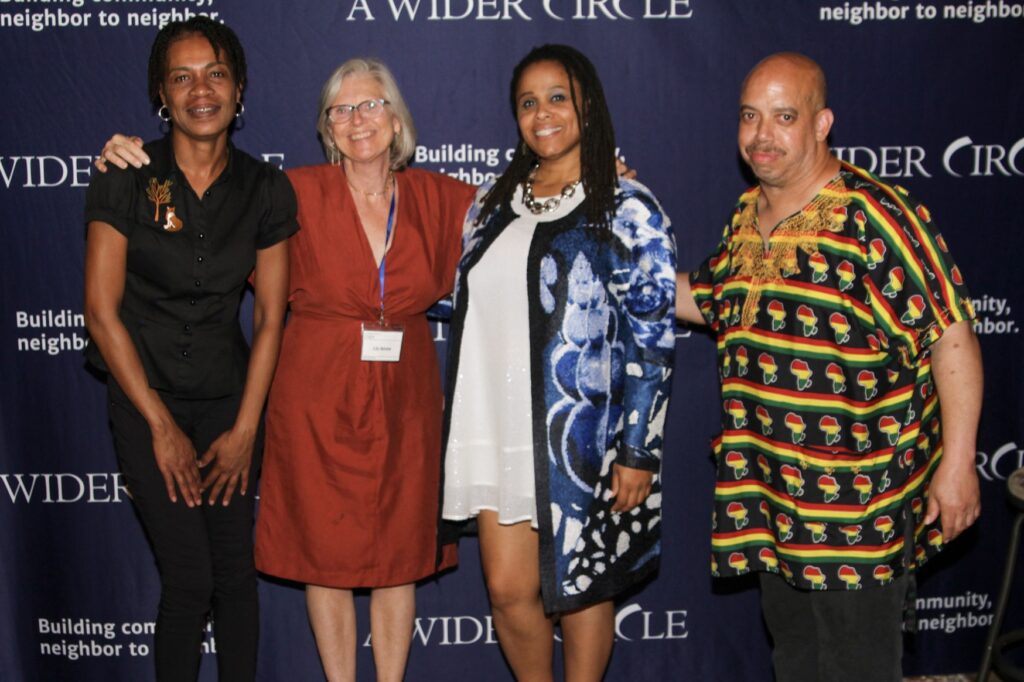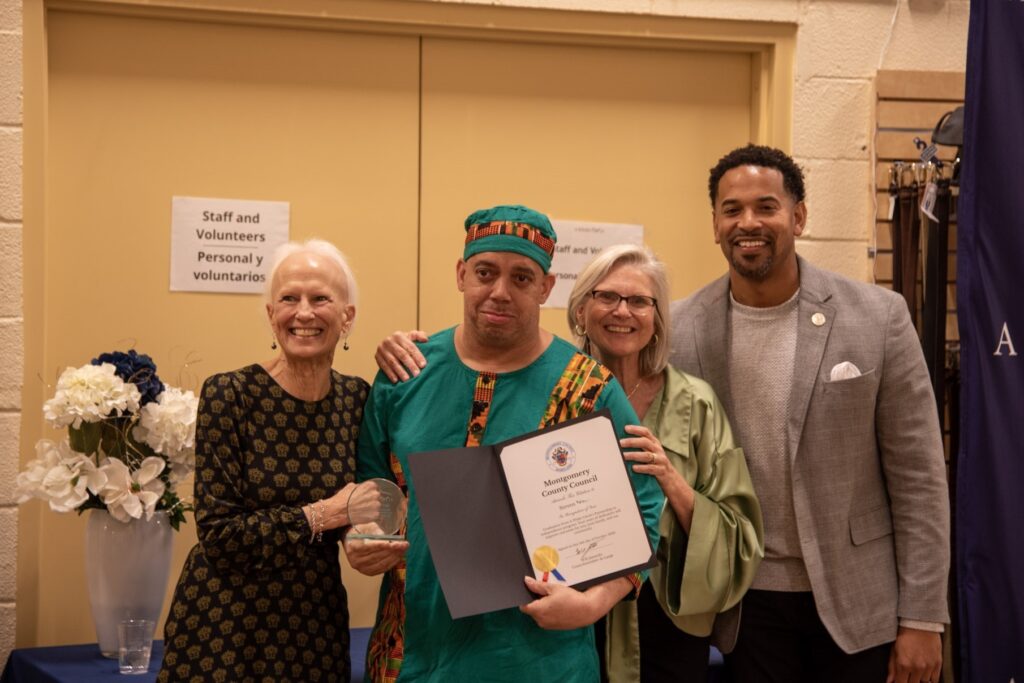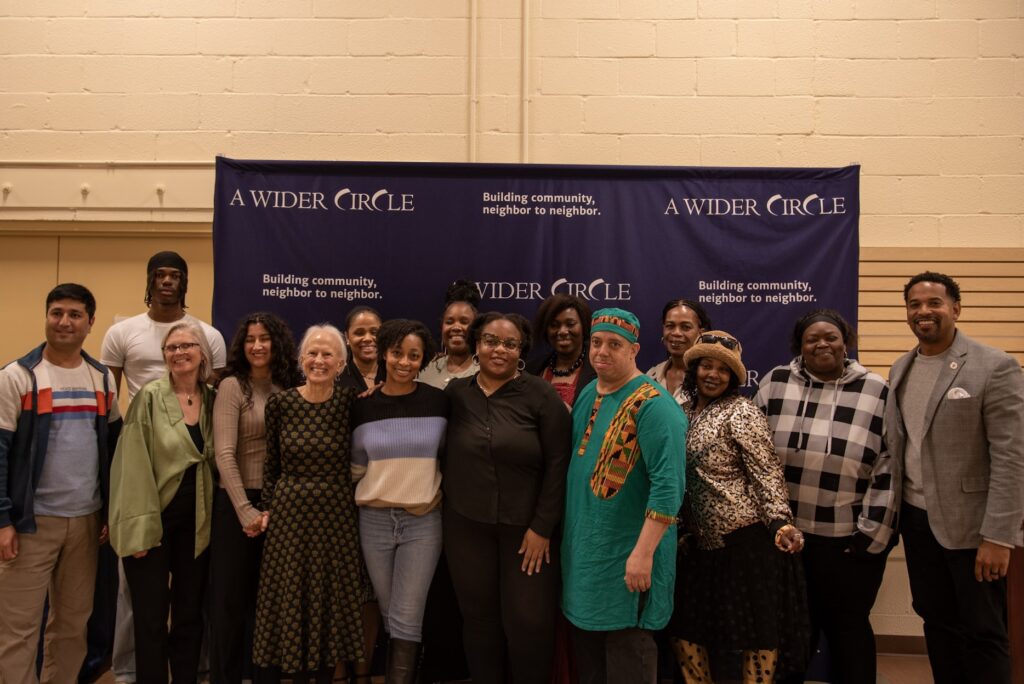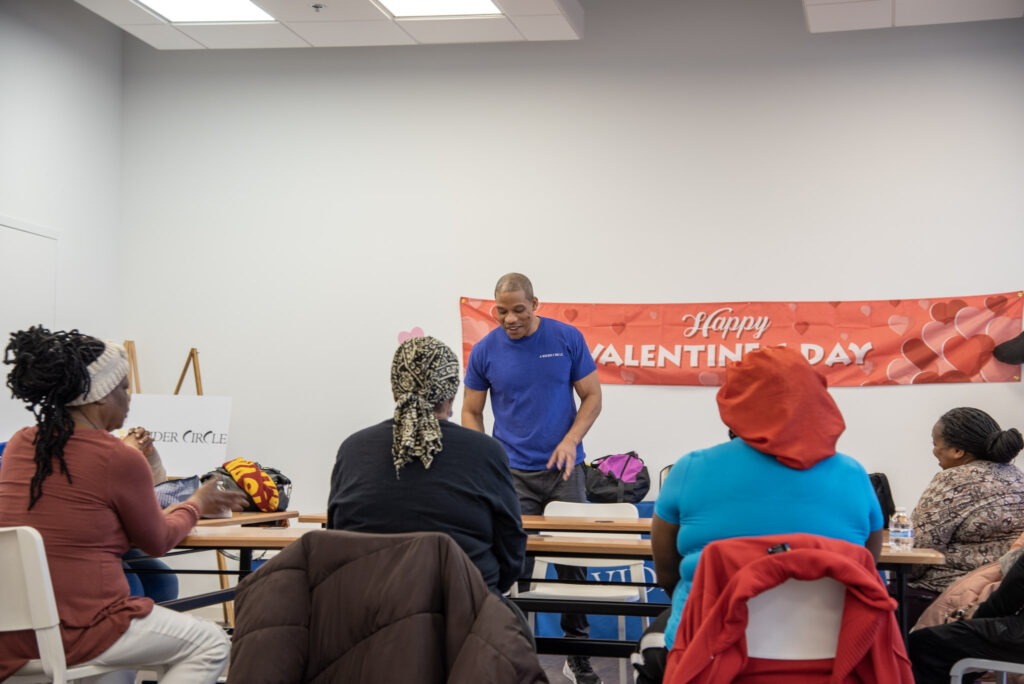Liz Anne Ganiban, Co-Founder of A Wider Circle’s Partnership to Independence Program, Retires

Liz Anne Ganiban (second from the left) with three members of P2I’s first graduating class at A Wider Circle’s Neighbor to Neighbor Night in 2023.
Editor’s note: In December 2023, Liz Anne Ganiban, Senior Director of our Partnership to Independence (P2I) program, retired after 13 years with A Wider Circle. Before leaving, she sat down with journalist and AWC volunteer Maggie Fox to reflect on her time leading P2I.
They went from being broke, sometimes living in shelters, to holding down full-time, satisfying jobs, some earning more than $60,000 a year.
The 15 graduates of A Wider Circle’s first Partnership to Independence class owe all of their success to themselves, but Liz Anne Ganiban gave them the support and encouragement they needed to make it happen. As a co-founder of the program and the most recent person to retire from A Wider Circle, she developed and perfected the “wraparound” approach that integrates career counseling with financial management training, wellness education, emergency assistance, and life coaching.
Five years later, the results are startling. “We have a law school graduate. We have someone who completed her master’s last year. A couple of people are taking classes towards a bachelor’s degree,” Liz Anne says.
A lawyer by training, Liz Anne has long had an interest in helping people improve their circumstances. In 2010, before she came to A Wider Circle, she was working for senior housing programs in the District of Columbia and running workshops for high school students who were pregnant or parenting.
Prior work — including running Wraparound Support, a predecessor to the program — helped her develop the insights that led to the launch of the Partnership to Independence (P2I) program in 2018.
“Most of the people in our program were born in poverty,” Liz Anne says. “Almost everybody’s experienced some type of trauma in their life. Even just living in poverty is trauma but in addition, there’s domestic violence, there’s homicides in the family. There are various things – homelessness.”
No one in the program is a quitter. “Every single person in our system wanted to work. They wanted careers,” Liz Anne says. “But they needed support and not simply piecemeal support. They needed full-time advocates.”
“Financial, health and wellness, workforce development, and social support and networking are the four corners of the program.”
Liz Anne explains, “We knew that we couldn’t do just workforce development. For someone to work, they had to be healthy. They also had to manage their finances. We also had to have a support system. So they are all combined – financial, health and wellness, workforce development, and social support and networking are the four corners of the program.”
Even when someone wants badly to work, the barriers that exist everywhere are far harder to overcome for those living in poverty and for those holding the types of jobs that tend to be both low-paying and inflexible.
“Some hourly paid positions will fire you if you have a child who’s sick or a child you have to pick up from school one day,” Liz Anne says. “In addition to that, each week is different so nobody can plan what their schedule is like or what daycare is like. Some, because they are so frustrated and so stressed out by life in general, they may have some anger management issues.”
Liz Anne realized that people didn’t just need help writing resumes. They needed help scheduling their lives.
“Some people had been home with children for some years and it was time to return. Some lost their homes and then lost their jobs,” she said. For those living in shelters, it was nearly impossible to seek work with any consistency, especially because of strict policies about when people can actually be inside the shelter. “You have to be out at a certain time. You can’t go back in and change for an interview,” Liz Anne says.
Those with low-paying jobs had extra obstacles to overcome. What might be a minor inconvenience for someone in a salaried position can be a disaster for an hourly worker.
“One little thing goes wrong and there’s a spiral downhill with bills you have to pay,” Liz Anne says. “You need to fix a tire to get to work.” But that can take time, and being a half-hour late to some jobs means at best getting pay docked and often means getting fired.
“It is a lot of work. We spend a lot of time with people.”
The wraparound care approach means Liz Anne and colleague Anne Thompson, who moved on from A Wider Circle in 2022, acted as full-time advocates for the 18 clients who started the program in 2018. With Thompson’s support, Liz Anne organized twice-weekly classes where participants learned about managing money, developed job interview skills, and filled out applications. She spent hours on the phone, navigating the tricky systems utilities have for cutting off electricity or water for late payments. She helped find social services representatives who wanted to help clients get through the red tape.
“To get benefits, people have to take off from work, wait in line, talk to people who are sometimes overworked and frustrated and angry with them,” Liz Anne says. “More commonly there are people on the other side of the counter who don’t treat you like a human being.” She helped with that.

From left to right: Anne Thompson, P2I graduate Steve W., Liz Anne Ganiban, and Montgomery County Councilmember Will Jawando pose for a photo at the graduation ceremony for P2I Cohort 1.
Help finding the best therapists
“Some have mental health issues like the rest of the world does. Some people’s problems are a little more extreme than we were aware of. So for them, their success is they are seeing a therapist consistently and feeling better about themselves so they can look for a job soon,” Liz Anne adds.
“It’s really, really hard to find a therapist in general, and finding a therapist through Medicaid is almost impossible. That’s part of our job as an advocate. I’m on the phone all the time, trying to find people that I can say, ‘Call Janet and she can help you.’ It is a lot of work. We spend a lot of time with people.”
What’s most important, says Liz Anne, is losing any notion that as a helper, she knew what was best.
“We supported them. We helped them make their own choices. We weren’t telling them, ‘You have to do this, this, and this,’” Liz Anne says.
“We weren’t there to do any of that. We wanted them to make their own decisions, and we gave them the tools to do that. What I have heard from people is that they were lost and we were there to help them.”
“We supported them. We helped them make their own choices. We weren’t telling them, ‘You have to do this, this, and this.’”
It’s an intensive approach that saw a few people exit early. Three of the original 18 left before graduation.
One needed cancer treatment, Liz Anne says. At least one felt ashamed about slow progress and dropped out. One moved away from the area.
Sometimes, A Wider Circle provided a little cash to stop the heat from being turned off, but the program is not about giving clients money. Most only needed the occasional small boost. The program provided $48,000 in emergency funds over five years to help with rent payments to prevent evictions, pay utility and cellphone bills or to make up for lost food benefits, pay medical bills or fill in childcare costs.
“At one point we did give every person $250 to open up a savings account,” Liz Anne says. At the start of the program, four of the clients had savings accounts. By last year, 13 out of the 15 in the program had them. Federal stimulus funds provided as part of the COVID response were helpful. “We saw that people weren’t wasting [it]. They were spending it on food. They were spending it on debt and they were spending it on rent. So if we can give people a little extra so they don’t have to worry all the time and stress about it, it would make them so much more successful,” Liz Anne says. The program hopes to raise more funds to incorporate cash assistance as an essential component in the future.
Earning Money and Buying Homes
Liz Anne is more than pleased with the results. “We have four people now that are making over $62,000. Somebody is working for USAID in international policy. Somebody is working at Howard University law school. Two other people are working at technical companies,” she says with evident pride.
Four clients own their homes and two are looking to buy. Two children of clients have graduated from college and two more children are currently in college. One participant earned a master’s degree and another a Juris Doctorate. “We have a teacher, assistant teachers, people who have done retail,” Liz Anne says.
Among them is Billi W., who had been homeless when she started the program. While taking part in P2I, she started law school. “I found my dream job while I was in law school,” she says in a video. “I am the managing director of the civil rights center at the law school and I am able to do pretty amazing things.”
She’s also a Community Advisory Board member and volunteers with the incoming Partnership to Independence group.
“I can tell you that 89% of this cohort has increased their credit scores,” Liz Anne says. “Sometimes it has been by a couple hundred points. Nine out of 13 people have credit scores over 650 now.” That, in turn, helps make it easier to buy a house, to get a credit card, and to stay afloat when times get tough.

The graduating members of P2I Cohort 1 pose for a group photo with their advocates and Councilmember Jawando.
Rewarding commitment
Part of the success of the program comes from admitting clients in the first place who were ready to commit to five years of intense work. “The large majority of people we serve at A Wider Circle are women heads of household,” Liz Anne says. “They are the people who are raising their children and need to make the money. Women still don’t make as much as men. They are the ones who have to lose the hours of work when the children are sick and they have to stay home.”
Mika G. is one. “I was living in a homeless shelter with my (son), at the time, he was 7… I felt like I didn’t really get any help as far as resources,” she says in a video.
Liz Anne, she says, became her advocate. “She has become like family for me,” Mika says. “It’s very difficult for me to ask for help.” Liz Anne showed her how to get help without feeling like a failure. “They advocate for you,” Mika says. “They help you get on your feet.”
It helped just having someone believe in her. “The biggest misconception about living in poverty is it’s your fault. You must have done something to become homeless,” Mika says. She doesn’t feel that’s true.
“I went to school. I’ve always had good job and unfortunately, life happens,” she says. She sent out resumes and volunteered. Persistence, and support, paid off. Mika applied for a job with Montgomery County Public Schools. “They offered her a job within the week,” Liz Anne says.
Mika has hope for her son, who’s now 12. “My son’s life now will be different because he has stability now,” she says. “My next goal now is, of course, learning how to save money.” And she wants to go back to school.

Derrick Faison, Advocate for P2I Cohort 2, leads a workshop at A Wider Circle’s Ward 8 Hub.
A new generation
Liz Anne retired from A Wider Circle at the end of 2023 and handed over the reins for the next P2I cohort to A Wider Circle’s Derrick Faison.
But she thinks the program can serve as an example for something bigger – nationwide, even. “There needs to be more help on federal, state, and county levels, and programs that work,” Liz Anne says.
It will take a special kind of person to help, and some changes in attitude to gain support, Liz Anne believes.
“They have to get rid of all their biases and their stereotypes – that people who are not working are lazy and don’t want to work,” she says.
“If you just spent five minutes talking to anybody that I work with, you’d know they have all these desires and they want to work. There’s just something that’s standing in their way that’s either prevented them from working or having a high-paying job. But they want to do it,” she adds.
“Everybody’s human. And everybody has the same problems. But the problems are a lot worse when you don’t have any money. It’s crazy to live in this country when there’s so much money and people have to do so much to get so little.”
And having friends helps in ways that cannot be measured. Part of the success for the first cohort was the group they formed, she says. “They were 18 complete strangers. They came together and they formed this family. And they would all encourage each other.”
Five years is a long time. The second P2I group will be together for three years. “The second cohort are already bonding. They have been together since [last] February. I am hoping that will continue,” Liz Anne says. It helps to be physically close, too. All of the new cohort’s members live near A Wider Circle’s Ward 8 Hub in Southeast DC.
The 14 households of this new cohort, representing 36 people, are meeting with Derrick and other colleagues regularly and are working hard on their career and financial goals.
And even in retirement, Liz Anne doesn’t plan to lose touch with the first graduates. “They have become part of my family,” she says.
“I care about what happens to them.”



